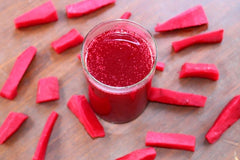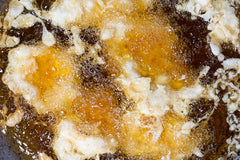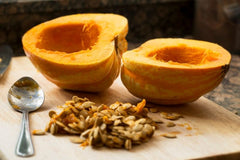How To Make Fermented Eggs

Easy to make and delicious, fermented eggs are so much tastier than the simple hard-boiled eggs. Plus, they are versatile both in terms of flavor and use. You can make them spicy with jalapenos and peppercorns or you can add garlic, dill, and many other spices. As for use, you can add them to your favorite salad, serve them for breakfast or turn them into deviled eggs.
What You Need to Make Fermented Eggs
We've got a good guide and some detailed instructions below, but if you want to hurry up and gather up an egg-fermenting tool kit, here's what you need:
- Easy Fermenter Lids
- Fermenting Weights
- Quart sized mason jar & mason jar lid
- Steamer basket
- Saucepan
- Measuring cups
- Mixing Bowl
We also have other fermenting tools that could be useful; check them out here. Also, if you'd like to see a video of how to do this kind of thing, we have fermenting video instructionals here.
What’s The Difference Between Fermented Eggs And Pickled Eggs?
Fermented eggs are similar in taste with hard-boiled eggs, especially if you use a simple salted brine. They are just a bit fizzy and have a slightly different texture.
The method used for preserving them is similar to pickling, except no vinegar is involved. That’s why the taste is closer to hard-boiled eggs than pickled eggs.
When you pickle eggs, you want to store the jar in the fridge for two days whereas for the fermented version you store the jar at room temperature.
Fermented eggs last less than pickled eggs but due to their mild flavor they are more versatile and you can use them in many recipes.
How Long Do Fermented Eggs Last?
If you made pickled eggs before, you know they can last for up to a month in the fridge. Fermented eggs don’t last that long but you can still store them for about two weeks in the fridge.
To be sure the eggs are safe to eat, do a smell test. If they smell the same as they did when you transferred them to the fridge, they are still good and safe to eat. If you notice any changes in smell, throw them away.
Fermented Eggs Flavors
Our fermented eggs recipe makes hard-boiled eggs with a fermented zing. However, you can mix things up and turn the simple fermented eggs into fancy snacks or appetizers. To do so, you can add various ingredients to the brine. Here are some recommendations for you:
- Dill
- Peppercorn
- Jalapenos
- Garlic
- Onions
- Kimchi brine
- Sauerkraut brine
Tips For Making The Best Fermented Eggs
If you never made fermented or pickled eggs before and you feel a little nervous about the process, we have a few extra tips that will help you out:
Make Sure the Eggs Are Hard-Boiled
Typically, hard-boiled eggs take between 12 and 18 minutes to cook. If you boil them in a pot of water, start timing after the water starts to boil. For this method, 12 minutes should be more than enough but you can boil for 15 minutes just to be sure.
If you use the steamer method recommended in our recipe, you have to add the eggs to the steamer basket after the water is boiling. If you have a single layer of eggs in the basket, the eggs will be ready faster. For 15 eggs, as the recipe requires, you’ll have to layer the eggs, therefore we recommend 18 minutes of steaming.
Fermentation Time
Two or three days are usually recommended for fermented eggs. However, since fermentation needs to happen at room temperature, you can adjust the time as needed. During summer, it is recommended to reduce the time since the high temperatures can spoil the eggs. If you are worried, you can open the jar and do a smell test. If the eggs smell rotten, it is best to toss them.
During winter months, or if you prefer a bit more fizz, you can ferment the eggs for an extra day or two.
Fermented Eggs Recipe
Ingredients
- 15 eggs
- 1/4 cup whey*
- 1 tablespoon of sea salt
- 1 cup of filtered water
*Alternatively, you can use 1/2 teaspoon culture starter or brine for a previous ferment
- Easy Fermenter Lids
- Fermenting Weights
- Quart sized mason jar & mason jar lid
- Steamer basket
- Saucepan
- Measuring cups
- Mixing Bowl
Instructions
- Fill the saucepan with water until it reaches the bottom of the steamer basket (approximately 1 inch). If you don’t have a steamer basket, just fill the saucepan with ½ inch water.
- Heat water on high heat until it boils and produces steam.
- Turn the heat off.
- Place the 15 eggs in the steamer basket or at the bottom of the saucepan.
- Cover the saucepan with a lid and steam for approximately 18 minutes on medium heat.
- Remove the eggs from the steamer basket and place them in a bowl of ice water.
- Let the eggs cool completely.
- In the meantime, mix the whey (or the culture starter) and salt into a cup of water to make the brine. Stir until the whey and salt dissolve.
- Peel the eggs and place them in the jar.
- Pour the brine over the eggs. You can add more water if necessary.
- Cover the jar with the Easy Fermenter Lid and place the Fermentation Weights in the jar to ensure perfect fermentation results.
- Allow the eggs to ferment for 3 days, at room temperature.
- Once the fermentation process is over, store the fermented eggs in the fridge.
Want To Take Your Fermenting To the Next Level?
Enroll in our Fermenting Mastery Video Series. A complete set of detailed, step-by-step instructions that will give you the confidence to create ferments that you’re proud of, every single time. Even when you make up your own recipes and techniques! Included are 14 professionally recorded recipes - Over two hours of content to help you master your ferments.









